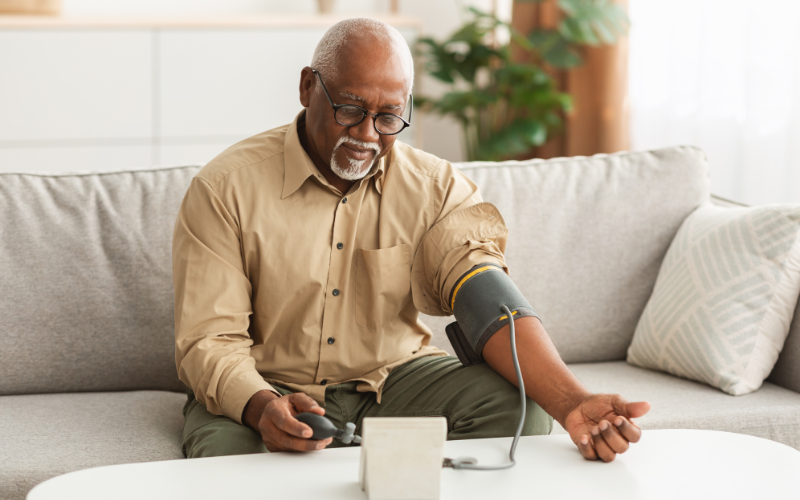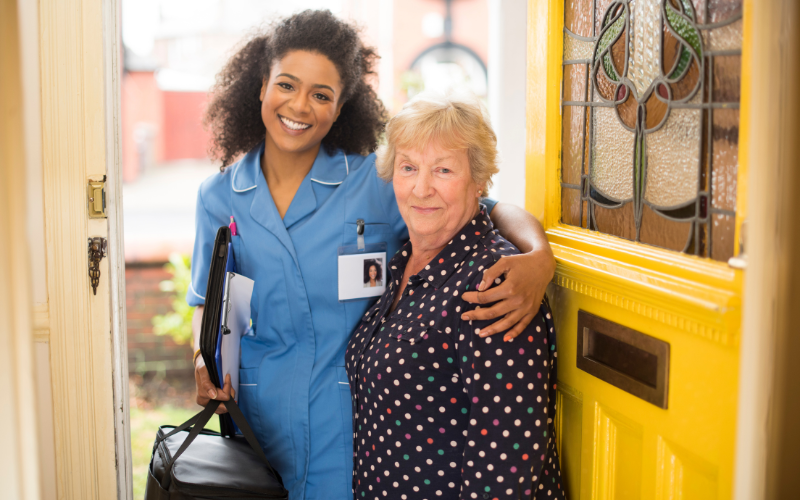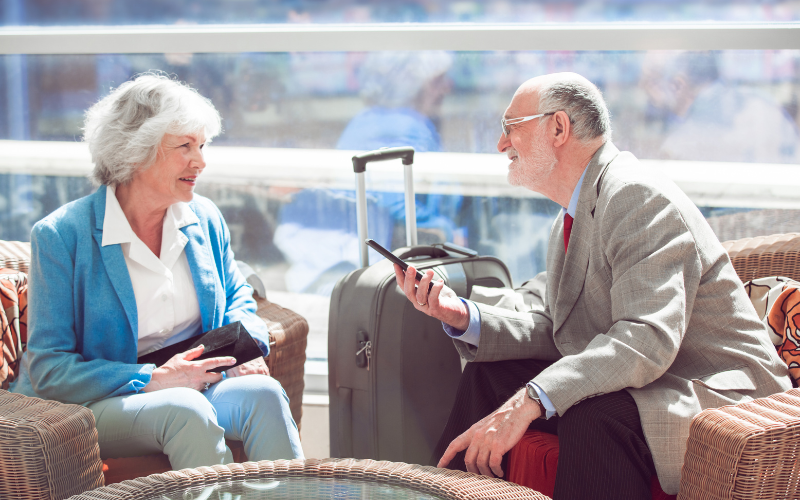
The aging process causes changes in the body, leading to conditions like high blood pressure. Also known as hypertension, high blood pressure commonly affects seniors. Many older people are unaware that they even suffer from this silent killer. Here’s what seniors and caregivers must know.
Aging blood vessels, medically known as the vascular system, undergo changes. As arteries stiffen with age, blood pressure rises. Even heart-healthy seniors who feel perfectly healthy can be affected. Hypertension doesn’t always cause symptoms that can be felt or seen.
How is blood pressure measured?
Seniors may be familiar with the blood pressure readings they receive at medical checkups. The physician assistant wraps a blood pressure cuff around their arm. The tightening and loosening of the cuff help doctors measure the elderly patient’s blood pressure.
Medical professionals look at two numbers when interpreting results: systolic blood pressure and diastolic blood pressure. Systolic blood pressure is the pressure caused by the heart as it pushes out blood. When the heart relaxes and fills with blood, it is referred to as diastolic blood pressure.
Elderly patients are given their blood pressure reading, which is comprised of two numbers: the systolic blood pressure over the diastolic blood pressure. Normal blood pressure is when the top number (systolic blood pressure) is less than 120, and the bottom number (diastolic blood pressure) is under 80.
Seniors can experience elevated blood pressure when their systolic blood pressure is between 120 and 129 and their diastolic blood pressure is less than 80. High blood pressure occurs when their systolic pressure is 130 or higher and their diastolic pressure is 80 or higher.
Low blood pressure is known as hypotension and is also a possible outcome. This condition can cause symptoms, such as dizziness, lightheadedness, fainting, and weakness. For these seniors, their systolic blood pressure is lower than 90 or their diastolic blood pressure is under 60.
What are the health consequences of high blood pressure?
Seniors can experience normal, elevated, or low blood pressure. The chief health concern is when they live with high blood pressure. In some older adults, their systolic pressure is usually 130, but their diastolic pressure is less than 80—this is known as isolated systolic hypertension.
Isolated systolic hypertension is a health problem that arises when the major arteries stiffen due to natural aging. This type of high blood pressure is common among seniors. Elderly individuals can suffer serious health consequences when their condition is left untreated.
For example, seniors diagnosed with isolated systolic hypertension experience shortness of breath while engaging in light exercises or activities. If they stand up too fast, the condition can trigger lightheadedness. Older patients are also susceptible to falls and their life-threatening outcomes.
The health consequences of high blood pressure in aging adults are concerning—but the lack of symptoms makes this condition a double threat. This is the reason that older people are advised to visit the doctor routinely to get their blood pressure checked.
How is high blood pressure managed?
If the physician detects increasing levels during two or more checkups, the senior should consider treatment options. Oftentimes, the doctor works with the aging patient to determine an ideal blood pressure target, then recommends lifestyle changes that can help lower their blood pressure.
Seniors with high blood pressure can incorporate regular exercise, make dietary changes, or take prescription drugs to help control their condition. Overweight individuals are at a higher risk for high blood pressure. Maintain a healthy weight to keep high blood pressure under control.
Lowering high blood pressure can also be achieved by following a physical activity schedule. Engage in moderate exercise, like walking or swimming, for at least 150 minutes per week. Seniors with untreated health conditions should consult their doctor before beginning an exercise regimen.
Nutrition plays a big role in helping seniors reduce their high blood pressure. Eat a balanced diet, consisting of plenty of fruits, vegetables, grains, oils, and dairy. Simplify meal planning by adhering to the Dietary Approaches to Stop Hypertension (DASH) eating plan.
Healthy lifestyle habits are also critical. Aging smokers are urged to quit, since smoking increases their risk for high blood pressure as well as other health concerns, like heart disease. Limit alcoholic drinks to lower blood pressure; men can have up to 2 drinks daily and women up to 1.
Medications to control high blood pressure are also options given to elderly patients. Be aware that prescription drugs only control the condition and do not cure it. Seniors who start blood pressure medications may have to take them long-term to experience the benefits.
Blood pressure drugs should be taken at the same time each day to be effective. When seniors’ blood pressure readings are lower, that indicates their lifestyle improvements and medications are working. Healthy lifestyle changes may even lower the dose of blood pressure drugs that a senior needs.
Taking medications on time, scheduling regular exercise and eating healthily can be achieved when seniors utilize support from Assisting Hands Home Care. Our professional caregivers ensure older adults remain healthy whether they’ve been diagnosed with high blood pressure or any other condition.

Elder care is comprehensive and delivered in the comfort of the senior’s home. Caregivers prepare nutrient-rich meals, keep seniors hydrated, give timely medication reminders, provide transportation to medical checkups, and establish an exercise schedule to promote the well-being of care recipients.
Incorporate the exceptional care from Assisting Hands Home Care into your elderly loved one’s life. Our flexible senior care services meet the needs of aging people and their families. Whether you desire occasional respite care, live-in care, or post-surgical care, we offer care options that meet your needs.
Assisting Hands Home Care caters to older adults living in Burr Ridge, IL | Lyons, IL | Indian Head Park, IL | McCook, IL | Hodgkins, IL | Countryside, IL | Willow Springs, IL | Palisades, IL | La Grange Highlands, IL | Clarendon Hills, IL | Brookfield, IL | Western Springs, IL | Hinsdale, IL | Darien, IL | La Grange, IL | Downers Grove, IL | Oak Brook, IL | Willowbrook, IL, and the neighboring communities. When health and well-being are priorities for your loved one, trust our home care agency. Contact us today to schedule a free in-home consult and begin quality elder home care.















